Marriage and Cohabitation in the U.S.
The share of adults who have lived with a romantic partner is now higher than the share who have ever been married; married adults are more satisfied with their relationships, more trusting of their partners
As more U.S. adults are delaying marriage – or forgoing it altogether – the share who have ever lived with an unmarried partner has been on the rise. Amid these changes, most Americans find cohabitation acceptable, even for couples who don’t plan to get married, according to a new Pew Research Center survey. Even so, a narrow majority says society is better off if couples in long-term relationships eventually get married.
The survey also examines how adults who are married and those who are living with an unmarried partner are experiencing their relationships. It finds that married adults are more satisfied with their relationship and more trusting of their partners than those who are cohabiting.
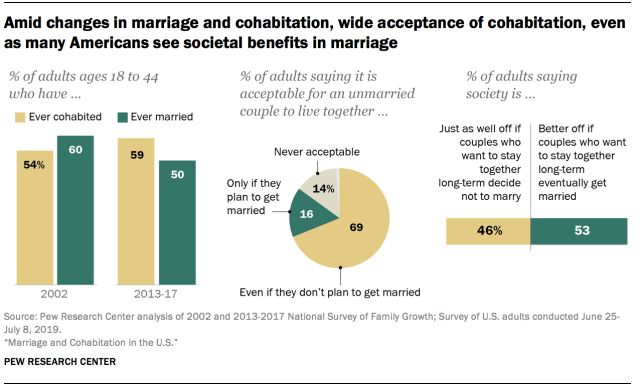
The share of U.S. adults who are currently married has declined modestly in recent decades, from 58% in 1995 to 53% today. Over the same period, the share of adults who are living with an unmarried partner has risen from 3% to 7%. While the share who are currently cohabiting remains far smaller than the share who are married, the share of adults ages 18 to 44 who have ever lived with an unmarried partner (59%) has surpassed the share who has ever been married (50%), according to a Pew Research Center analysis of the National Survey of Family Growth (NSFG).1
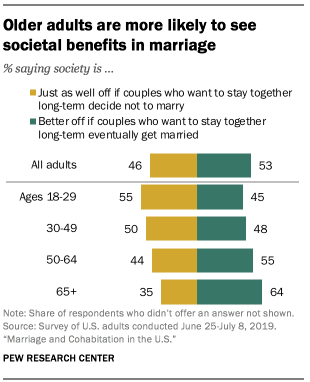 Young adults are particularly accepting of cohabitation – 78% of those ages 18 to 29 say it’s acceptable for an unmarried couple to live together, even if they don’t plan to get married – but majorities across age groups share this view. Still, even among those younger than 30, a substantial share (45%) say society is better off if couples who want to stay together long-term eventually get married. Roughly half of those ages 30 to 49 say the same, as do majorities of those ages 50 and older.
Young adults are particularly accepting of cohabitation – 78% of those ages 18 to 29 say it’s acceptable for an unmarried couple to live together, even if they don’t plan to get married – but majorities across age groups share this view. Still, even among those younger than 30, a substantial share (45%) say society is better off if couples who want to stay together long-term eventually get married. Roughly half of those ages 30 to 49 say the same, as do majorities of those ages 50 and older.
Views about marriage and cohabitation are also linked to religious affiliation. About three-quarters of Catholics (74%) and white Protestants who do not self-identify as born-again or evangelical (76%) say it’s acceptable for an unmarried couple to live together even if they don’t plan to get married. By contrast, only 47% of black Protestants and 35% of white evangelical Protestants share this view. And while half or more across these groups say society is better off if couples who want to stay together long-term eventually get married, white evangelicals are the most likely to say this (78% do so). Among those who are not religiously affiliated, fully nine-in-ten say cohabitation is acceptable even if a couple doesn’t plan to get married, and just 31% say society is better off if couples who want to stay together eventually get married.
The nationally representative survey of 9,834 U.S. adults was conducted online June 25-July 8, 2019, using Pew Research Center’s American Trends Panel.2 The survey includes 5,579 married adults and 880 adults who are living with an unmarried partner. It includes married and cohabiting adults in same-sex relationships. 3 Among the other key findings:
Married adults have higher levels of relationship satisfaction and trust than those living with an unmarried partner
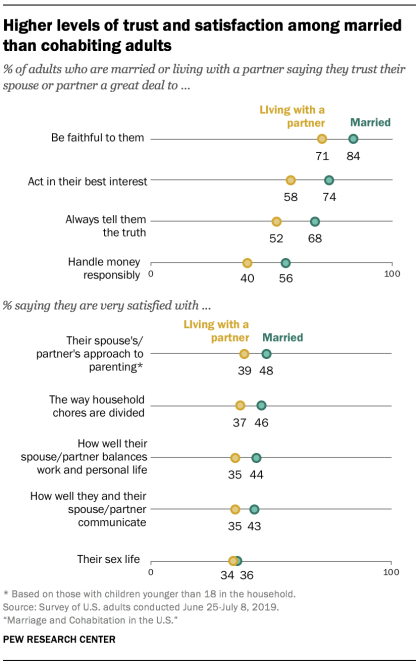 Majorities of married and cohabiting adults express at least a fair amount of trust in their spouse or partner to be faithful to them, act in their best interest, always tell them the truth and handle money responsibly, but by double digits, married adults are more likely than those who are cohabiting to express a great deal of trust in their spouse or partner in each of these areas.
Majorities of married and cohabiting adults express at least a fair amount of trust in their spouse or partner to be faithful to them, act in their best interest, always tell them the truth and handle money responsibly, but by double digits, married adults are more likely than those who are cohabiting to express a great deal of trust in their spouse or partner in each of these areas.
Married adults also express higher levels of satisfaction with their relationship. About six-in-ten married adults (58%) say things are going very well in their marriage; 41% of cohabiters say the same about their relationship with their partner.
When asked about specific aspects of their relationship, larger shares of married than cohabiting adults say they are very satisfied with the way household chores are divided between them and their spouse or partner, how well their spouse or partner balances work and personal life, how well they and their spouse or partner communicate, and their spouse’s or partner’s approach to parenting (among those with children younger than 18 in the household). When it comes to their sex life, however, similar shares of married and cohabiting adults say they are very satisfied.
Married adults are also more likely than cohabiters to say they feel closer to their spouse or partner than to any other adult. About eight-in-ten married adults (78%) say they feel closer to their spouse than to any other adult in their life; a narrower majority of cohabiters (55%) say the same about their partner.
Even after controlling for demographic differences between married and cohabiting adults (such as gender, age, race, religion and educational attainment), married adults express higher levels of satisfaction, trust and closeness than those who are living with a partner.
The reasons why people get married and the reasons they move in with a partner differ in some key ways
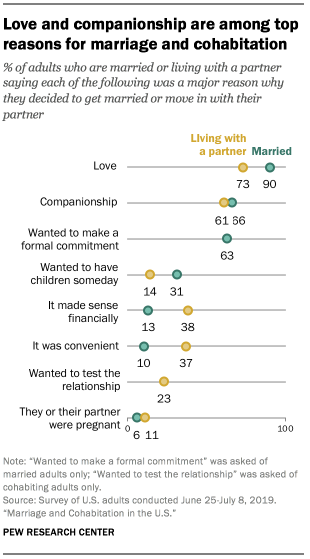 Most married and cohabiting adults cite love and companionship as major reasons why they decided to get married or move in with a partner. But about four-in-ten cohabiters also say finances and convenience were important factors in their decision: 38% say moving in with their partner made sense financially and 37% say it was convenient. In comparison, just 13% of married adults cite finances and 10% cite convenience as major reasons why they decided to get married.
Most married and cohabiting adults cite love and companionship as major reasons why they decided to get married or move in with a partner. But about four-in-ten cohabiters also say finances and convenience were important factors in their decision: 38% say moving in with their partner made sense financially and 37% say it was convenient. In comparison, just 13% of married adults cite finances and 10% cite convenience as major reasons why they decided to get married.
About six-in-ten married adults (63%) say making a formal commitment was a major factor in their decision to get married. This is particularly the case among those who did not live with their spouse before getting married.
Among cohabiters, about a quarter (23%) say wanting to test their relationship was a major reason why they decided to move in with their partner.
Many cohabiting adults see living together as a step toward marriage
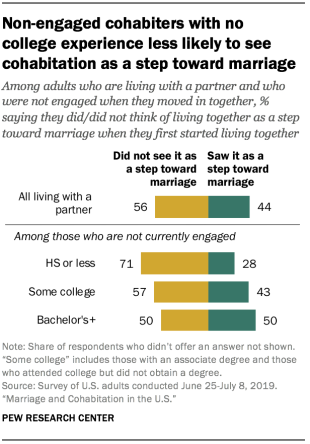 Most married adults (66%) who lived with their spouse before they were married (and who were not yet engaged when they moved in together) say they saw cohabitation as a step toward marriage when they first started living with their now-spouse. Among cohabiting adults who were not engaged when they moved in with their partner, 44% say they saw living together as a step toward marriage. Cohabiters who have gotten engaged since moving in with their partner are more likely than those who are not currently engaged to say they saw living together as a step toward marriage (63% vs. 38%).
Most married adults (66%) who lived with their spouse before they were married (and who were not yet engaged when they moved in together) say they saw cohabitation as a step toward marriage when they first started living with their now-spouse. Among cohabiting adults who were not engaged when they moved in with their partner, 44% say they saw living together as a step toward marriage. Cohabiters who have gotten engaged since moving in with their partner are more likely than those who are not currently engaged to say they saw living together as a step toward marriage (63% vs. 38%).
Among cohabiters who are not currently engaged, those with at least some college education are more likely than those with less education to say they saw moving in with their partner as a step toward marriage. Half of cohabiting college graduates who are not engaged – and 43% of those with some college experience – say this, compared with 28% of those with a high school diploma or less education.
About four-in-ten cohabiting adults who are not currently engaged (41%) say they want to get married someday. Of this group, 58% say they are very likely to marry their current partner, while 27% say this is somewhat likely and 14% say it’s not too or not at all likely that they will marry their partner. About a quarter of non-engaged cohabiters (24%) say they don’t want to get married, and 35% aren’t sure.
Two-thirds of cohabiters who want to get married someday cite either their own or their partner’s finances as a reason why they’re not engaged or married
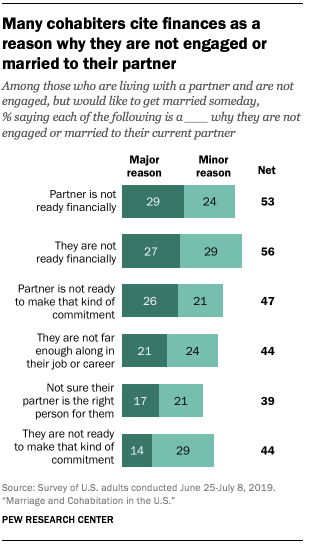 About three-in-ten cohabiting adults who are not engaged but say they would like to get married someday say their partner’s (29%) or their own (27%) lack of financial readiness is a major reason why they’re not engaged or married to their current partner. About a quarter (24%) say their partner not being ready financially is a minor reason, and 29% say the same about their own finances.
About three-in-ten cohabiting adults who are not engaged but say they would like to get married someday say their partner’s (29%) or their own (27%) lack of financial readiness is a major reason why they’re not engaged or married to their current partner. About a quarter (24%) say their partner not being ready financially is a minor reason, and 29% say the same about their own finances.
Roughly four-in-ten cite not being far enough along in their job or career as a major or minor reason why they’re not engaged or married to their partner. Similar shares say they (44%) or their partner (47%) not being ready to make that kind of commitment is at least a minor reason why they’re not engaged or married, though more cite their partner not being ready, rather than themselves, as a major reason (26% vs. 14%).
Younger adults are more likely to see cohabitation as a path to a successful marriage
About half of U.S. adults (48%) say couples who live together before marriage have a better chance of having a successful marriage than those who don’t live together before marriage; 13% say couples who live together before marriage have a worse chance of having a successful marriage and 38% say it doesn’t make much difference.
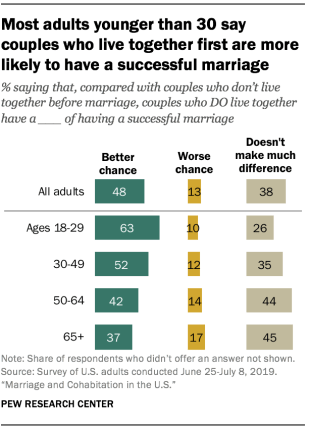 Adults younger than 30 are more likely than older adults to see cohabitation as a path to a successful marriage: 63% of young adults say couples who live together before marriage have a better chance of having a successful marriage, compared with 52% of those ages 30 to 49, 42% of those ages 50 to 64 and 37% of those 65 and older. About a third or more of those 30 and older say cohabitation doesn’t have much of an impact on a couple’s chance of having a successful marriage.
Adults younger than 30 are more likely than older adults to see cohabitation as a path to a successful marriage: 63% of young adults say couples who live together before marriage have a better chance of having a successful marriage, compared with 52% of those ages 30 to 49, 42% of those ages 50 to 64 and 37% of those 65 and older. About a third or more of those 30 and older say cohabitation doesn’t have much of an impact on a couple’s chance of having a successful marriage.
Adults who lived with their spouse before they were married are much more likely than those who didn’t to say that couples who live together have a better chance of having a successful marriage (57% vs. 24%, respectively). About a third of married adults who didn’t live with their spouse before marriage (32%) say cohabitation worsens a couple’s chance of having a successful marriage, while 44% say it doesn’t make much difference.
A majority of Americans say cohabiting couples can raise children just as well as married couples
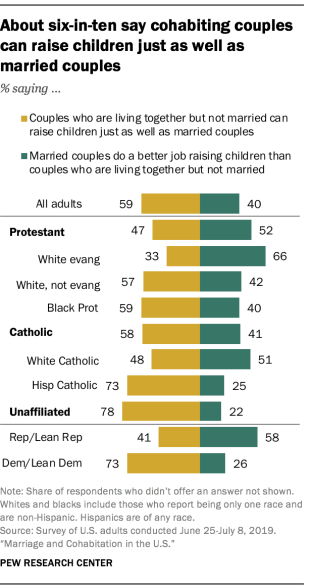 Just over half of cohabiting adults ages 18 to 44 are raising children, including about a third who are living with a child they share with their current partner. A majority of Americans (59%) say that unmarried couples who are living together can raise children just as well as married couples; 40% say couples who are married do a better job raising children.
Just over half of cohabiting adults ages 18 to 44 are raising children, including about a third who are living with a child they share with their current partner. A majority of Americans (59%) say that unmarried couples who are living together can raise children just as well as married couples; 40% say couples who are married do a better job raising children.
White non-evangelical Protestants (57%) and black Protestants (59%) are far more likely than white evangelicals (33%) to say cohabiting couples can raise children as well as those who are married.
There are also differences among Catholics: 73% of Hispanic Catholics – compared with 48% of white Catholics – say cohabiting and married couples can raise children equally well.
Views on this are also linked to partisanship. Overall, 73% of Democrats and those who lean Democratic say cohabiting couples can raise children just as well as married couples; 41% of Republicans and those who lean to the GOP say the same. These gaps persist even when taking religion and age, which are strongly linked to partisanship, into account.
Cohabiting adults (82%) are far more likely than those who are married (52%) to say couples who are living together but are not married can raise children as well as married couples. Cohabiters with and without children younger than 18 in the household are about equally likely to hold this view.
Most Americans favor allowing unmarried couples to have the same legal rights as married couples
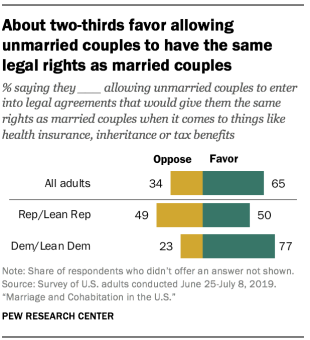 About two-thirds of U.S. adults (65%) say they favor allowing unmarried couples to enter into legal agreements that would give them the same rights as married couples when it comes to things like health insurance, inheritance or tax benefits; 34% oppose this. For the most part, views about these types of legal agreements don’t vary considerably along demographic lines, although white (66%) and Hispanic (68%) adults are more likely than black adults (58%) to express support.
About two-thirds of U.S. adults (65%) say they favor allowing unmarried couples to enter into legal agreements that would give them the same rights as married couples when it comes to things like health insurance, inheritance or tax benefits; 34% oppose this. For the most part, views about these types of legal agreements don’t vary considerably along demographic lines, although white (66%) and Hispanic (68%) adults are more likely than black adults (58%) to express support.
About three-quarters of Democrats (77%) favor allowing unmarried couples to enter into these types of legal agreements. In contrast, Republicans are about evenly divided, with 50% saying they favor and 49% saying they oppose this.
Most don’t see being married as essential to living a fulfilling life
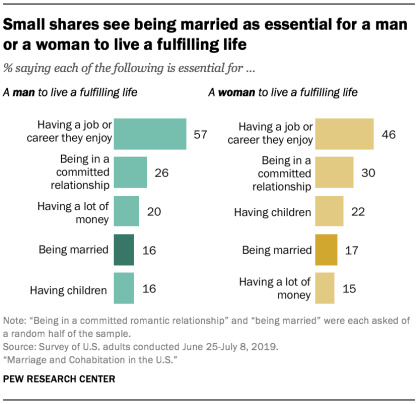 Relatively small shares of U.S. adults say being married is essential for a man (16%) or a woman (17%) to live a fulfilling life; 54% say being married is important but not essential for each, while about three-in-ten say being married is not important for a man (29%) or a woman (28%) to live a fulfilling life. When asked more generally about the importance of being in a committed romantic relationship, 26% say this is essential for a man and 30% say it is essential for a woman to live a fulfilling life.
Relatively small shares of U.S. adults say being married is essential for a man (16%) or a woman (17%) to live a fulfilling life; 54% say being married is important but not essential for each, while about three-in-ten say being married is not important for a man (29%) or a woman (28%) to live a fulfilling life. When asked more generally about the importance of being in a committed romantic relationship, 26% say this is essential for a man and 30% say it is essential for a woman to live a fulfilling life.
Far larger shares see having a job or career they enjoy as essential in order for a man (57%) or a woman (46%) to live a fulfilling life. One-in-five say having a lot of money is essential for a man, while 15% say it is essential for a woman. When it comes to having children, 22% see it as essential in order for a woman to live a fulfilling life; 16% say this is essential for a man.

No comments:
Post a Comment